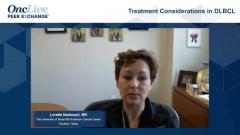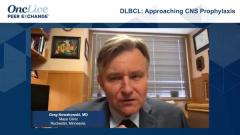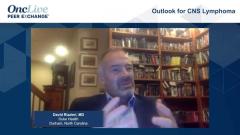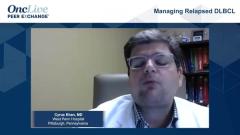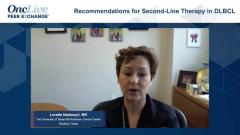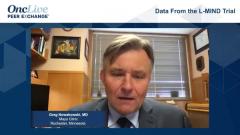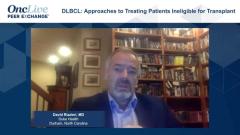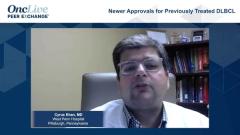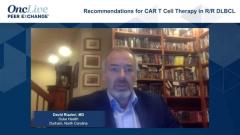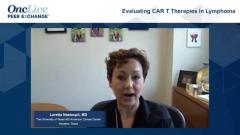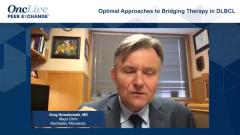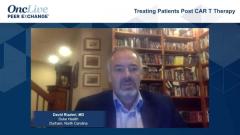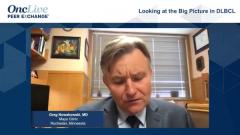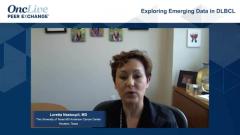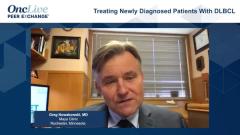
Recommendations for CAR T-Cell Therapy in R/R DLBCL
Experts in lymphoma explain when and for which patients CAR T therapies are recommended in R/R DLBCL.
Episodes in this series

John Leonard, MD: I now want to move to CAR [chimeric antigen receptor] T-cell therapy, and that certainly has been the big development over the last several years, and I think we would all agree, has changed outcomes and rescued some patients who had few other options. The modality doesn’t work for everyone, clearly, but enough people that it has made an impact. I want to ask Greg first, and then David, your take on who you recommend for CAR T. I want to ask Greg more from the perspective of what clinical scenario versus the others, and then David, your take with regard to risk for toxicity, and who you might exclude or be more or less hesitant to consider. Greg, why don’t you start, and then we’ll go to David?
Greg Nowakowski, MD: One patient category that clearly would be candidates for CAR T-cell therapy, and I do those referrals quite often, are patients failing salvage chemotherapy prior to transplant. This is a group we alluded to, very difficult to salvage with subsequent lines of chemotherapy, and get them to transplant. And even if we do, the benefit of the transplant in this setting is questionable because they were already chemotherapy refractory. Those patients usually have good performance status and good organ function because they were candidates for transplant. That’s a big category. Obviously, folks who relapse unfortunately after transplant are also candidates for CAR T-cell therapy, and I do refer those quite often. There is this expanding group of patients who are not initially considered for transplant due to age, performance status, or organ function limitations who are now potentially candidates for CAR T-cell therapy as well. It’s a little bit of a moving target, it depends on the approach of the center, and sometimes if it’s on the protocol inclusion criteria, but I’ve been able to get CAR T-cell therapy for patients older than we typically would consider for the transplant.
John Leonard, MD: David, your take on this, and who are the patients you think are eligible, or perhaps less? One of the questions that comes up, do you debulk patients? Do you try to give them some chemotherapy first, beyond the bridging treatment? Are there people who are at greater risk for toxicity, where you’re more concerned from that angle? How do you approach it, as far as a candidate? And then, in a minute, we’ll get into the individual constructs.
David Rizzieri, MD: Sure. I think this is an evolving area of our understanding. We were so worried early on about killing off these living, dividing, proliferating cells, and not intervening early to manage adverse effects such as CRS [cytokine release syndrome] or neurotoxicity with steroids and whatnot. We now know that we can safely do that, and we’ve minimized toxicities much more so than our first studies, and we haven’t compromised efficacy, at least from our current data. And so, while we’re concerned about patients being more infirm, and if they get CRS or neurotoxicity, being able to have that reserve to recover them, by being more aggressive and more proactive at heading off these adverse effects at earlier grades, I think we’ve made a big impact on tolerance and the ability to offer this therapy. In terms of who I consider, it’s much as Greg and others have mentioned, in my practice, it would be the reinduction therapy failing the patient. Then I think they’re an excellent candidate. And age-wise, this is a stumbling block. Age is not by itself a reason not to transplant a patient today. Based on comorbidities, etc, we regularly and routinely are performing autologous transplant in patients well into their 70s, and that’s the same type of patient we’d be thinking about for CAR T. Not to be ageist, but how old is too old to have a durable benefit, either from auto transplant or CAR T? Is it 79, is it 81? I don’t know the answer to that, but it’s something we have to come to terms with, I think, as a community as well.
John Leonard, MD: David, let me ask you this as a follow-up, the other question that comes up, before we get into the constructs. These are CD19-directed therapies, tafasitamab, loncastuximab are CD19-directed. Is your general advice to people that if you’re planning on referring a patient to CAR T to avoid those drugs? Do you think it’s fine? I know there are data suggesting that people can respond even having a different CD19-directed therapy. Clearly, this is under study, and it’s not absolutely contraindicated, but what guidance do you give people who might be thinking about sending patients for CAR T but need something first?
David Rizzieri, MD: I’ll clearly show my bias, because I have no data, so I’ll put it out there for others to blow back at me, but as you mentioned, there are conflicting data out there. In the ALL [acute lymphoblastic leukemia] setting, we’re concerned about prior CD19-directed therapy before CAR T, but even there, some of the data are conflicted, and we have even less guidance in the lymphoma setting. My own practice pattern is I would like at least one chemoimmunotherapy regimen to fail a patient before I go to the newer, targeted therapies, given we don’t quite yet know that we’re going to have the same robust response with overlapping CD19-directed therapies. But after that, given as you, and Loretta, and others have mentioned, with the principle of diminishing returns with further chemoimmunotherapy, I’m not going to keep using that, and I would go to a CD19-directed therapy potentially before even, as a bridge to CAR T.
TRANSCRIPT EDITED FOR CLARITY


